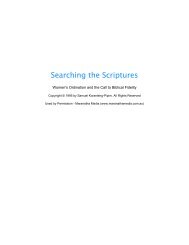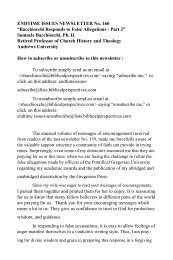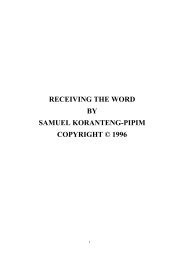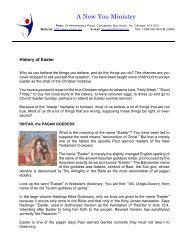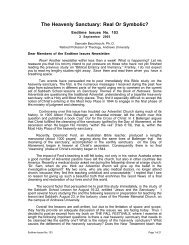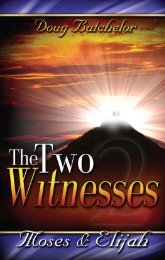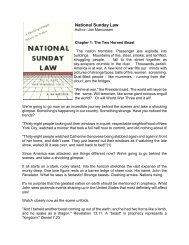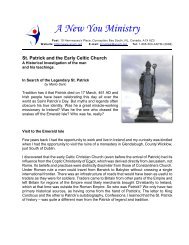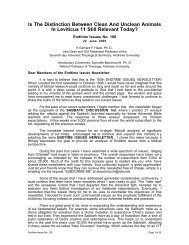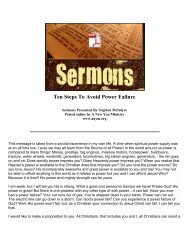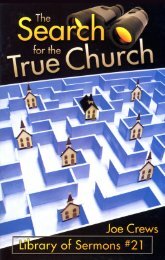Bible Readings for the Home Circleâ1914 - A New You Ministry
Bible Readings for the Home Circleâ1914 - A New You Ministry
Bible Readings for the Home Circleâ1914 - A New You Ministry
Create successful ePaper yourself
Turn your PDF publications into a flip-book with our unique Google optimized e-Paper software.
BIBLE READINGS<br />
above God, and that is by assuming to change <strong>the</strong> law of God, and to<br />
require obedience to its own law instead of God’s law.<br />
8. What power has claimed authority to change <strong>the</strong> law of God<br />
The Papacy.<br />
9. What part of <strong>the</strong> law of God especially has <strong>the</strong> Papacy thought to<br />
change<br />
The fourth commandment.<br />
NOTES.— “They [<strong>the</strong> Catholics] allege <strong>the</strong> Sabbath changed into Sunday,<br />
<strong>the</strong> Lord’s day, contrary to <strong>the</strong> Decalogue, as it appears; nei<strong>the</strong>r is<br />
<strong>the</strong>re any example more boasted of than <strong>the</strong> changing of <strong>the</strong> Sabbath<br />
day. Great, say <strong>the</strong>y, is <strong>the</strong> power and authority of <strong>the</strong> church, since it<br />
dispensed with one of <strong>the</strong> ten commandments.” Augsburg Confession,<br />
Art. XXVIII.<br />
“It [<strong>the</strong> Roman Catholic Church] has reversed <strong>the</strong> fourth commandment,<br />
doing away with <strong>the</strong> Sabbath of God’s Word, and instituting<br />
Sunday as a holy day.” N. Summerbell, in “History of <strong>the</strong> Christians,”<br />
page 418.<br />
10. Why did God command Israel to hallow <strong>the</strong> Sabbath<br />
“And hallow My Sabbaths; and <strong>the</strong>y shall be a sign between Me and<br />
you, that ye may know that I am <strong>the</strong> Lord your God.” Eze. 20:20.<br />
NOTE.— As <strong>the</strong> Sabbath was given that man might keep God in mind as<br />
Creator, it can be readily seen that a power endeavoring to exalt itself<br />
above God would first try to cover up or remove that which calls man’s<br />
special attention to his Creator. This could be done in no o<strong>the</strong>r way so<br />
{441<br />
441} effectually as by setting aside God’s memorial—<strong>the</strong> seventhday<br />
Sabbath. To this work of <strong>the</strong> Papacy Daniel had reference when he<br />
said, “And he shall . . . think to change times and laws.” Dan. 7:25.<br />
11. Does <strong>the</strong> Papacy acknowledge that it has changed <strong>the</strong> Sabbath<br />
It does.<br />
NOTE.— “Question.— How prove you that <strong>the</strong> church hath power to<br />
command feasts and holy days<br />
Answer.— By <strong>the</strong> very act of changing <strong>the</strong> Sabbath into Sunday,<br />
which Protestants allow of and <strong>the</strong>re<strong>for</strong>e <strong>the</strong>y fondly contradict <strong>the</strong>mselves<br />
by keeping Sunday strictly, and breaking most o<strong>the</strong>r feast days<br />
commanded by <strong>the</strong> same church.” “Abridgment of Christian Doctrine,”<br />
by Rev. Henry Tuberville, D. D., of Douay College, France<br />
(1649), page 58.<br />
“Ques.— Have you any o<strong>the</strong>r way of proving that <strong>the</strong> church has<br />
power to institute festivals of precept<br />
“Ans.— Had she not such power, she could not have done that in<br />
which all modern religionists agree with her,— she could not have<br />
substituted <strong>the</strong> observance of Sunday, <strong>the</strong> first day of <strong>the</strong> week, <strong>for</strong><br />
<strong>the</strong> observance of Saturday, <strong>the</strong> seventh day, a change <strong>for</strong> which <strong>the</strong>re<br />
THE CHANGE OF THE SABBATH<br />
is no Scriptural authority.” “A Doctrinal Catechism,” by Rev. Stephen<br />
Keenan, page 174.<br />
“The Catholic Church of its own infallible authority created Sunday<br />
a holy day to take <strong>the</strong> place of <strong>the</strong> Sabbath of <strong>the</strong> old law.” Kansas<br />
City Catholic, Feb. 9, 1893.<br />
“The Catholic Church, . . . by virtue of her divine mission, changed<br />
<strong>the</strong> day from Saturday to Sunday.” Catholic Mirror, official organ of<br />
Cardinal Gibbons, Sept. 23, 1893.<br />
“Ques.— Which is <strong>the</strong> Sabbath day<br />
“Ans.— Saturday is <strong>the</strong> Sabbath day.<br />
“Ques.— Why do we observe Sunday instead of Saturday<br />
“Ans.— We observe Sunday instead of Saturday because <strong>the</strong><br />
Catholic Church, in <strong>the</strong> Council of Laodicea (A.D. 336), transferred <strong>the</strong><br />
solemnity from Saturday to Sunday.” “The Convert’s Catechism of<br />
Catholic Doctrine,” by Rev. Peter Geiermann, C. SS. R., page 50,<br />
third edition, 1913, a work which received <strong>the</strong> “apostolic blessing”<br />
of Pope Pius X, Jan. 25, 1910.<br />
What was done at <strong>the</strong> Council of Laodicea was but one of <strong>the</strong><br />
steps by which <strong>the</strong> change of <strong>the</strong> Sabbath was effected. See under<br />
questions 17–21. The date usually given <strong>for</strong> this council is 364 A.D.<br />
12. Do Catholic authorities acknowledge that <strong>the</strong>re is no command<br />
in <strong>the</strong> <strong>Bible</strong> <strong>for</strong> <strong>the</strong> sanctification of Sunday<br />
They do.<br />
NOTE.— “YOU may read <strong>the</strong> <strong>Bible</strong> from Genesis to Revelation, and<br />
you will not find a single line authorizing <strong>the</strong> sanctification of Sunday.<br />
The Scriptures en<strong>for</strong>ce <strong>the</strong> religious observance of Saturday, a day<br />
which we never sanctify.” Cardinal Gibbons, in “The Faith of Our<br />
Fa<strong>the</strong>rs,” edition 1892, page 111.<br />
“Sunday is a Catholic institution, and its claims to observance<br />
can be defended only on Catholic principles. . . . From beginning to<br />
end of Scripture <strong>the</strong>re is not a single passage that warrants <strong>the</strong> transfer<br />
of weekly public worship from <strong>the</strong> last day of <strong>the</strong> week to <strong>the</strong> first.”<br />
Catholic Press (Sydney, Australia), Aug. 25, 1900. {442<br />
442}<br />
13. Do Protestant writers acknowledge <strong>the</strong> same<br />
They do.<br />
NOTE.— “Is <strong>the</strong>re no express commandment <strong>for</strong> observing <strong>the</strong> first<br />
day of <strong>the</strong> week as Sabbath, instead of <strong>the</strong> seventh day— None<br />
whatever. Nei<strong>the</strong>r Christ, nor His apostles, nor <strong>the</strong> first Christians celebrated<br />
<strong>the</strong> first day of <strong>the</strong> week instead of <strong>the</strong> seventh as <strong>the</strong> Sabbath.”<br />
<strong>New</strong> York Weekly Tribune, May 24,1900.<br />
“The Scriptures nowhere call <strong>the</strong> first day of <strong>the</strong> week <strong>the</strong> Sabbath.<br />
. . . There is no Scriptural authority <strong>for</strong> so doing, nor of course<br />
any Scriptural obligation.” The Watchman (Baptist).<br />
“The observance of <strong>the</strong> first instead of <strong>the</strong> seventh day rests on<br />
<strong>the</strong> testimony of <strong>the</strong> church, and <strong>the</strong> church alone.” Hobart Church




